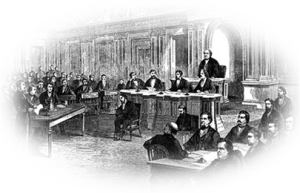
Torres vs. International Food Bazaar:
Our client was a former employee of a local grocery store who was awarded a judgment for wages, penalties and interest after filing a claim with the California Labor Commissioner.
His previous lawyers could not collect the judgment (roughly $75,000) other than $5,000 in a bank levy, because after the judgment, the store was “sold” from the parent/owners to their sons, who then claimed it was a “new” business. (Even though it was still a grocery store, doing business at the same location, with the same employees, and using part of the “old” business name).
The “new” owners paid the judgment, plus interest, plus attorney’s fees after Rousso & Jackel’s motion to modify the judgment (adding the “new” business as a judgment debtor) was granted. The court essentially agreed that the “old” and “new” businesses were one and the same.
Vallabhaneni vs. DSP:
A “cautionary tale:” We recently represented a Silicon Valley engineer who wasn’t paid for services he provided to a local high tech firm. He had contracted to do a project for them for approximately six weeks, as an “independent contractor.” He worked 40 hours per week for four weeks and submitted regular invoices. After four weeks, he was dismissed.
The employer refused to pay the contracted amount as submitted on the invoices (a little more than $13,000.00) claiming that the engineer’s work was not up to scratch and that the job “could have been accomplished faster.” The employer instead offered to pay a little less than one-third of what was invoiced, stating “take that or take nothing.”
The parties’ contract provided for arbitration of all disputes. After requesting arbitration, the engineer came to us. We viewed him as an employee, even though the written agreement said he was an “independent contractor.”
Why? He worked full time on site, using tools and equipment supplied by the employer and, probably most important, took direction on how to do his work. The employer did not merely request a finished product.
The arbitrator (a retired judge) found that our client was an employee, not an “independent contractor” despite the contract and his brief employment. In addition to awarding his wages, the arbitrator awarded penalties of $20,000.00, interest, attorney’s fees and costs!
Thus a claim originally worth just over $13,000.00 ended up at over $50,000.00.
The important lesson here is that employers all over Silicon Valley routinely misclassify engineers as “independent contractors.” As the employer here learned, this can be a very costly error. A prudent employer (especially a small business owner, where one mistake can put one out of business) will consult legal counsel to ensure that workers are properly classified and being paid for all hours worked, including overtime.
Campa vs. Rapid Plumbing:
Mr. Campa was one of five named plaintiffs Rousso & Jackel represented in a class action tried in Los Angeles County Superior Court. The plaintiffs represented a class of over 500 plumbers who were denied overtime after their employer claimed they were “exempt” as “outside salespersons.” The employer claimed that the plumbers’ “real” job was to “sell plumbing services.” The jury disagreed.
The case ultimately settled for $1.2 million.
Vinuya vs. Punzalen Management, Inc.:
Rousso & Jackel represented a former employee of a residential care facility for developmentally disabled adults who was not paid for overnight shifts, when she was required to be awake all night to monitor the patients. The employer claimed that she did not have to remain awake during the overnight shifts, even though the position was called “awake overnight staff.”
The California Labor Commissioner awarded pay for all hours worked, plus penalties.
Disgruntled Employees vs. Restaurant:
Confidential settlement of a claim of “discrimination” by a group of employees who walked off the job. After investigating the case, Rousso & Jackel persuaded plaintiffs’ counsel that the case was not really worth pursuing.
Plaintiffs, who initially demanded millions, accepted a “nuisance value only” settlement.
Morra vs. Affordable Roofing:
Rousso & Jackel represented a property owner who had contracted with a local roofing company to replace the roof on his historic commercial building in San Juan Bautista. He asserted various claims and after a lengthy court trial, the court found that the roofing company was negligent, awarding plaintiff a substantial amount in damages for lost rent and emotional distress. Over the objection of defendant, the court also awarded attorney’s fees, even though plaintiff did not prevail on his cause of action for breach of contract. The court agreed with plaintiff’s argument that the fee provision in the contract, which awarded fees to the party who “prevailed” in “any action arising from the contract” was broad enough to cover all claims, even torts.
The case settled for a confidential sum after the defendant filed an appeal.
Dr. X vs. Surgery Center (Confidential):
Rousso & Jackel represented a physician who had been a member of a limited partnership. He sued after his partnership interest was improperly “repurchased” based on his alleged “breach” of a covenant not to compete in the agreement. Rousso & Jackel filed a pre-trial motion alleging that the covenant not to compete was illegal and that it was not violated, if it was enforceable. A judge agreed, finding that there was no basis for claiming a breach of the agreement at the time of the “repurchase.” This led the defendant to request mediation for the purpose of settling the case.
The case settled for terms that are confidential.
Campos and Spoulos v. Santa Clara County:
Rousso & Jackel represented two investigators from the District Attorney’s Office who were transferred from their positions as Criminal Investigators for the D.A. to lower paying positions as Welfare Fraud Investigators for the Social Services Agency.
An arbitrator ordered that they be reinstated and compensated for all lost wages and benefits.
Gonzales and Lemus vs. A & A Distribution Inc.:
Rousso & Jackel represented two former employees of a company that delivered newspaper circulars and ads. The owner of the company claimed that they were “independent contractors,” even though he supplied their tools and controlled the way in which they did their job, not just the result. The jury agreed that one plaintiff was an employee but disagreed about the other. Rousso & Jackel filed a post-trial motion which said, in essence, that the jury was mistaken about the one employee.
The court agreed and found that both plaintiffs were in fact employees of the company. Following this, the court awarded $129,831.75 for attorney’s fees.
Jane Doe vs. Local Branch of National Non-Profit (Confidential):
Rousso & Jackel represented a woman who alleged that her termination was a violation of the Fair Employment and Housing Act. The case settled for terms that are confidential.
Inda vs. Fidelity & Guaranty Life Insurance:
Our client, an auto mechanic, had faithfully paid the premiums on a life insurance policy that carried a disability rider. When he injured his shoulder and needed surgery, he applied for benefits and was denied–twice–even though his doctor confirmed he was totally disabled. The stated reason was that he was “capable of desk work,” even though there was no evidence and no reason to believe that “desk work” was available at an auto repair shop.
The company initially ignored our letters but immediately responded after Rousso & Jackel utilized social media to leave an wrote an open letter regarding the matter on the company’s Facebook wall.
Within a matter of days, all of the back benefits were paid, PLUS an additional one-third as attorney’s fees.
Mac Cal Company vs. SV Precision:
Rousso & Jackel obtained a pre-judgment writ of attachment which resulted in the Sheriff seizing $110,918.10 from the defendant’s bank account. The case settled shortly thereafter.
Jane Doe vs. Federally Subsidized Apartment Complex (Confidential):
Rousso & Jackel represented a client who was injured in her apartment. The plaintiff claimed that the defendant had violated the Federal Rehabilitation Act relating to the disability of a tenant. The case settled shortly before trial.
Farhangui vs. BASG:
Plaintiff was a member of an LLC formed for the purpose of constructing and then running an outpatient surgery center. Shortly after the project got underway, he decided that he did not want to continue with the venture and at his request, the LLC was dissolved. The remaining members formed a new corporate entity and after some years and spending millions of dollars, got the surgery center up and running. After the center was finally operating at a profit, plaintiff sued, claiming that he had been “defrauded” into giving up his interest. He sued the entity and the individual members. After a two-week jury trial, the jury returned a verdict in defendants’ favor on all claims.
Rousso & Jackel thereafter obtained an award of $214,189.50 for attorney’s fees for their clients and defended that award successfully on appeal.
Malate vs. Ruiz/YTR Homes:
Rousso & Jackel represented a married couple who had been unlawfully denied overtime wages after working for years in defendants’ group home for developmentally disabled adults. A unanimous jury awarded all wages requested and the trial court later awarded attorneys’ fees and costs. Defendants’ appeal was rejected by the California Appellate Court.
In the end, Rousso & Jackel collected nearly $500,000.00 in back wages, penalties, and attorneys’ fees.
Jane Doe vs. National Children’s Retail Clothing Company:
Rousso & Jackel represented a woman who alleged that she was fired after complaining about illegal wage practices occurring in the company. The terms of the settlement are confidential.
Stevens v. Cooper-Fowler Media Company:
Rousso & Jackel filed another successful motion to quash service of process for two out-of-state clients who were sued by a local company. The clients were dismissed from the lawsuit.
Engineers vs. High Tech Firm X (Confidential):
Rousso & Jackel represented three engineers who alleged that they had been wrongfully terminated from their positions with a large Silicon Valley high-tech firm after the company tried to misappropriate their intellectual property.
The clients had essentially been abandoned by their original attorneys.
Rousso & Jackel were able to put the case back on a sound footing and negotiated a generous settlement for their clients.
Appro Tech. vs. FDR Enterprise, Inc.:
Another successful motion to quash service of summons for lack of personal jurisdiction on behalf of an out-of-state defendant sued in a collection matter.
Ron Miller Construction vs. Economic Social Opportunities:
Court trial concluded with a defense verdict after our client, a Silicon Valley non-profit agency, was sued for breach of contract.
Monterey County vs. Ken Rozin:
Monterey County vs. Tom Hall:
Two similar but unrelated cases where the clients were wrongfully terminated from their positions as a juvenile institutions officers. Rousso & Jackel prevailed in separate binding arbitrations which resulted in the clients’ reinstatement and retroactive award of benefits.
Eleanor Malate vs. California Department of Health Services:
Rousso & Jackel represented a nursing assistant whose license had been revoked by the California Department of Health Services. We petitioned the court for a writ of mandate directing the DHS to overturn its decision and the petition was granted after a court trial in San Mateo County.
Jane Doe vs. Careless Driver (Confidential):
Rousso & Jackel represented a woman who was seriously injured by a driver who made an unsafe lane change on Highway 17 south. Defendant initially denied liability but painstaking investigation revealed that it was impossible for the accident to have occurred in the manner claimed by defendant. She also learned that the chief witness for the defendant was her husband, whom she met the night of the accident while the parties and witnesses were gathered by the side of the freeway! The case settled on the eve of trial.
Grassadonia vs. TecHarmonic:
Rousso & Jackel successfully defended a high-tech manufacturing firm which was sued by a former employee for disability discrimination. The case never went to trial, because our summary judgment motion was granted, thereby saving the employer significant attorney’s fees in addition to not paying plaintiff one dollar.

